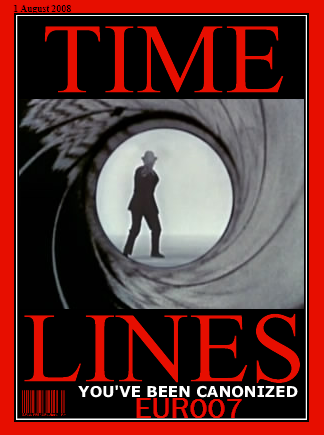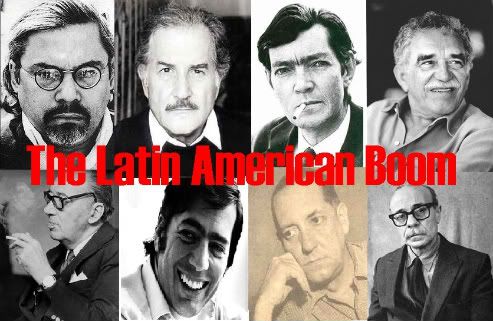[anchor=I13]
Capibara’s Hispanoamerican Corner[/anchor]
Section II: The Latin American Boom
By Capibara
Welcome to the second article of the Hispanoamerican Corner. After an overview of the origins of Spanish Literature in my previous article, this time I will start with the main theme of this section: The Latin American Boom and it’s writers. For this issue, an introduction will be given, as well as a quick overview of the main writers of this movement, focusing on each one of them in further articles.
The Latin American Boom was a literary movement that originated during the 1960s and the 1970s when young writers from Latin America became known in Europe, thanks to their innovative style and the publishing of their works by prestigious European publishing houses, specially the Spanish house Seix Barrel and it’s prize “Biblioteca Breve” (Short Library), that had the job of introducing this new group of young writers, that included Carlos Fuentes from Mexico, Julio Cortázar from Argentina, Gabriel García Márquez from Colombia, Mario Vargas Llosa from Perú and Alejo Carpentier from Cuba, among others.
Other factor that favored the development of the Boom, was the historical context of the epoch, characterized by the military dictatorships in many of the Latin American countries. This factor made the authors of the Boom include more social and political criticism against this regimes in their works, causing them to exile to Europe most of the times.
The Boom originates as a new literary style in Latin America, where the writers wouldn’t stick to one particular way of writing, but would try to explore and experiment in other areas, which would result in an innovative writing style, that would take influences from Latin American writers previous to the boom, like Jorge Luis Borges, considered the best Spanish speaking writer of the 20th century, and Mexican Juan Rulfo, as well as some English speaking writers, like Joyce and specially William Faulkner, mentioned by most of the Boom writers as one of their main influences.
Before proceeding with the boom aspects and it’s background, I will give the definition of the Boom that one of it’s writers, Mario Vargas Llosa, gave:
“There is clearly a rejection, that I believe is an essential part of the Boom, of the regionalist, folkloric literature, centered in the landscape and picturesque guys. The Boom, placed the stories in a more urban world and preoccupied both for the form and the themes.”
The first steps towards the Boom were taken during the 1940s, when the separation from Realism starts, with the new treatment of the themes and the experimentation with the language. Specifically, it was Argentinean writer Jorge Luis Borges who determined this new narrative constants. From these years we have, apart from Borges, Adolfo Bioy Casares, Miguel Ángel Asturias, Agustín Yáñez and Ernesto Sábato.
This renovation startede with Borges, would only increase during the next decade, where fantasy was fundamental, with the inclusion of new writers like Juan Carlos Onetti, with
La Vida Breve (A Brief Life) and
Para Una Tumba Sin Nombre (For a Grave With No Name) and Juan Rulfo with
Pedro Páramo, considered one of the best novels of the previous century. In this same decade, some writers of the Boom, like Carlos Fuentes and Gabriel García Márquez, started writing their first novels, although they aren’t considered integral part of the Boom still.
However, the real consolidation of the new movement occurred in the 1960s, when there was a sudden interest and demand for Latin American literature in the United States and Europe. From this decade we have some of the best novels of the period, including
La Ciudad y Los Perros (The City and The Dogs) by Vargas Llosa,
Tres Tristes Tigres (Tree Sad Tigers) by Guillermo Cabrera Infante,
Cambio de Piel (Change of Skin) by Carlos Fuentes and
El Obsceno Pájaro de La Noche (The Obscene Bird of the Night) by José Donoso. All of this novels get international recognition and translation to several languages.
Just as the previous ones, during the next years, several novels, emblems of this period are published:
Rayuela (Hopscoth) by Julio Cortázar,
Cien Años de Soledad (One Hundred Years of Solitude) by Gabriel García Márquez,
El Astillero (The Shipyard) by Juan Carlos Onetti,
Sobre Héroes y Tumbas (About Heroes and Graves) by Ernesto Sábato,
La Muerte de Artemio Cruz (The Death of Artemio Cruz) by Carlos Fuentes,
Conversación en la Catedral (Conversation in the Cathedral) by Mario Vargas Llosa and
Hijo del Hombre (Son of the Man) by Augusto Roa Bastos.
The decade of 1970 saw a change in the style of many of the Boom writers. Particularly thanks to the global situation of those years: the fluctuations in the global market, the political situation of the South American countries, among other factors, which leads to an increased social criticism in their works. During this years, it appears a new type of novel: the dictator novel, which, as the name says, tells about the dictators that ruled in Latin America then. An example of this kind of novel is
La Fiesta Del Chivo (The Goat’s Party) by Mario Vargas Llosa, that narrates the life of Rafael Trujillo, dictator of the Dominican Republic.
One of the main characteristics for the Boom is the fact that the writers don’t stick to a single literary movement, like Realism or Modernism, but try to innovate, to look for new ways of expressing, this results in what have been called “the new novel”. However, despite of not following a single style or movement, the Boom has it’s own particular aspects, that difference it from other literary currents.
This aspects include a preference for the urban above rural, the history as a metaphor, a social denounce, product of the situation mentioned above, criticism to the moral of the high classes and the mazes of experience of the youth. Along this aspects, we find the renovation of formal aspects and narrative techniques the treatment of the language as an alive organism and sufficient in itself; the establishment of imaginary spaces that participate with the mythic, the interior monologue and the rupture, a new interpretation of the constant of time and space, and again, using the language in all it’s possible forms, dismounting it, reintegrating it, always invent a new possibility of unconceivable expressive potential. This new novel, due to this aspects, may be also known as “the novel of the language” as Rodríguez Monegal said.
One of the styles more used by the writers of the Boom, was the one called Magical Realism, which main feature was the use of fantasy situations that include: long lives in a biblical style, levitation, miracles, imaginary illnesses that are exaggerated (hyperbole). This situations are written by the author in a neutral tone, without remarking the magical situation, so the reader does not pay that much attention to them and they look like everyday situation. The best example, probably, of magical realism is
Cien Años de Soledad by Gabriel García Márquez. This category also includes
Pedro Páramo by Juan Rulfo, which, it must be mentioned was a great influence for the latter.
Thanks to the Boom, the way Latin American culture was seen in the world changed. But mainly, it helped opening the door to young writers, that, thanks to the success of the Boom writers, who, in many of the occasions, served as their mentors. This new generation, belongs to what is known as the Post-Boom, that, even as a product of the Boom, is distinct in various aspects, mainly the presence of female writers like Elena Poniatowska, Isabel Allende and Luisa Valenzuela, and the change of the perceived elitism of the Boom to a more simpler and readable style, as well as the return to realism.
This generation of writers changed the Latin American literature and their influence it’s still felt nowadays. Next month I will start talking about each one of them, so you may know more about their work and style, starting with Mexican writer, Carlos Fuentes.
Capibara is the author of Italy: Tales of Friendship, Treason, Love and Death






